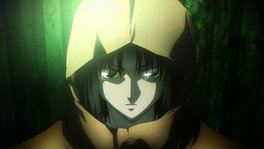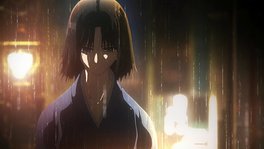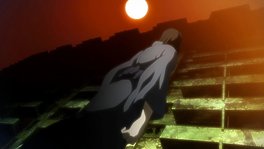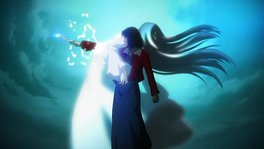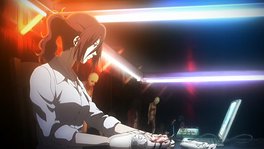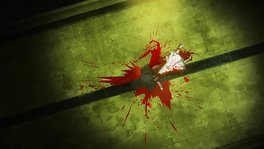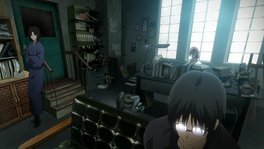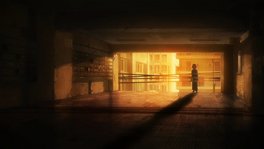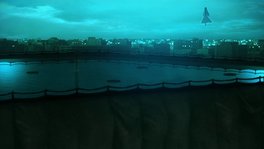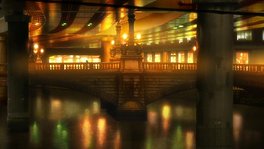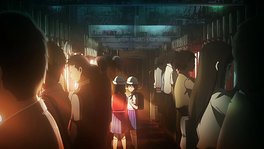There is a sense that Kara no Kyoukai (lit. Boundary of Emptiness): Overlooking View has something to prove; eager in both presentation and story it demands to be watched. It has every right to be keen with the success of six further instalments resting on it, the first movie can't simply warm up the engine or it risks losing an audience that is unfamiliar with its Type-Moon heritage or those with only a passing interest. The result is a movie that baffles as much as it entertains by taking a matter-of-fact approach to elements which, one can only hope, will be explored elsewhere and providing a measured introduction to the kaleidoscopic beauty of the characters and universe.
A spate of seemingly unrelated suicides catches the attention of Touko, a red-headed pseudo-detective nestled in a chaotically organised office, who asks the acerbic Shiki to look into them. From the pre-credits scene it is clear that Shiki shares a relationship with Mikiya who now sits torpid in Touko's office, his condition linked to the derelict apartment block where the suicides occurred. Visiting the building, Shiki finds another girl who has leapt to her death and spots nine spirits floating above the building. After relaying the information to Touko, she returns only to be resolutely beaten by a powerful resident spirit. Their final confrontation takes place atop the rotting building while Touko locates the source of both the spirits and the suicides.
Blending both action and mystery, Overlooking View is a superb gateway to the world presented by Kara no Kyoukai. Revealing just enough to tantalise and entice, the film can at first seem obtuse until it becomes obvious that explaining everything would needlessly mire the pace. Running just shy of fifty minutes, it is easy to consume and proves a litmus test for whether the rest of the series is worth sticking with: the pomp and dazzle is counterbalanced by slow and sometimes ponderous scenes that seem present only to pad out an otherwise typical structure. Undeniably gorgeous, it is frequently so opulent with mesmeric detail lavished on characters and scenery alike it is difficult to know where one ends and the other begins. Even when depicting bloody and graphic deaths the aesthetics are superbly composed and skilfully colour graded gifting every shot a coherent, tangible ambience bolstered by Yuki Kajiura's most restrained and atmospheric scores to date. Succeeding her pet project FictionJunction is Kalafina who undertake both opening and ending melody duties and have a haunting, unique signature that fits with both the movie as a whole and Kajiura's refined composition.
Lamentably the plot is unable to match the presentation and the film withholds a lot of the specifics to the detriment of continuity: at times feeling as if the narrative is intentionally restraining a jumble of trivia and what is present, burst unexpectedly from the seams. Shiki for instance obviously cares a great deal for the comatose Mikiya, enough to run off to a cursed and decaying building on a hunch, however there is no context for these actions and she is presented as needlessly arbitrary. Likewise Mikiya's condition is never given the focus one would expect and it is only rectified as a pleasant consequence of defeating the film's antagonist. Its stubborn refusal to expose anything too early in the series imbues one with the desire to see more simply to justify their investment rather than relying on the merits of the film alone.
But what merits there are - despite a restrained story it is still laden with meaning and pregnant with possibilities. Entropy permeates every scene with lonely, corroding cityscapes bathed in street lights, the buildings husks of their former selves. Touko speaks of soulless objects while Shiki stands beside motionless alabaster dolls, her prosthetic limb, hijacked by a malevolent spirit, is severed after a fight which could so easily descend into farce. Blasé at the inconvenience, she continues to operate as normal until gifted with a new arm: silicon and sinew combined. Now able to grasp spirits, the play on phantom limb syndrome is clear but the motif serves dual purposes of Shiki fighting against herself as well as the world at large. In less talented hands these themes would be wielded as cudgels rather than with the care and dexterity there are here.
The well told and otherwise straightforward story shows only a tantalising slice of a larger, more tumultuous world at the whim of spirits and magic and which the characters inhabit rather than wholly control. The movie seems crafted to inform the audience they are not seeing the full picture which can leave the ending largely unsatisfying. Were it not for the close release of the sequel, Murder Speculation (Part One), this could almost be written off as an overly pretentious opening to an art-house offering, that it manages to narrowly skirt this assumption is down to skill rather than luck.
All of this puts Kara no Kyoukai: Overlooking View in a self-made, difficult position: by refusing to ease in slowly, by opening in medias res, it presents itself as more complex than it should - but conversely by doing so it becomes a stellar opening gambit to the series and, given the source material, is perhaps the only satisfying way Kara no Kyoukai could have started. By being so brave it becomes divisive and relies on the subsequent films to contextualise its no doubt important story implications. For the most part it works beautifully and despite narrative quibbles it still towers above most any other media when it comes to atmosphere, possibility and sheer quality. It may not stand entirely on its own, but as a foundation and advertisement for the rest of the planned films, it is unparalleled.
